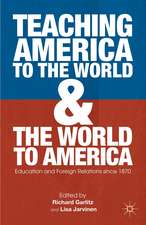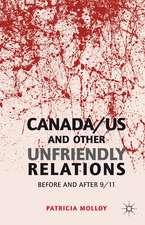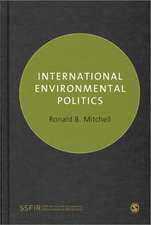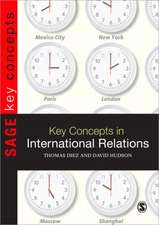Challenges for America in the Middle East
Autor Richard W. (Wallace) Mansbach, Kirsten L. Tayloren Limba Engleză Paperback – 20 iun 2016
Preț: 616.92 lei
Preț vechi: 801.19 lei
-23% Nou
Puncte Express: 925
Preț estimativ în valută:
118.04€ • 123.58$ • 97.68£
118.04€ • 123.58$ • 97.68£
Carte tipărită la comandă
Livrare economică 07-21 aprilie
Preluare comenzi: 021 569.72.76
Specificații
ISBN-13: 9781506308227
ISBN-10: 1506308228
Pagini: 368
Dimensiuni: 191 x 232 x 20 mm
Greutate: 0.5 kg
Ediția:Revised
Editura: SAGE Publications
Colecția CQ Press
Locul publicării:Washington DC, United States
ISBN-10: 1506308228
Pagini: 368
Dimensiuni: 191 x 232 x 20 mm
Greutate: 0.5 kg
Ediția:Revised
Editura: SAGE Publications
Colecția CQ Press
Locul publicării:Washington DC, United States
Recenzii
“Challenges for America in the Middle East helps students understand the environmental factors of Middle Eastern politics as they relate to the principles and ideas of American foreign policy. The authors present compelling arguments concerning the political reasoning behind American policy actions, as well as policy prescriptions that might be discussed or considered by key U.S. policy actors.”
“Mansbach and Taylor’s book examining the American role in and perspectives on recent developments in the Middle East is needed and timely. The strengths of Challenges for America in the Middle East are its accuracy, balance, clarity, and inclusion of well-considered policy options, which will stimulate and engage students in debates about the alternatives for American foreign policy. The authors have done a very impressive job.”
“There has long been a need for a book like Challenges for America in the Middle East. The book has the distinction of presenting students with clear policy options, inviting them to debate and reason policy alternatives. Mansbach and Taylor are very knowledgeable in the subject and present their analysis with clarity and confidence.”
“Challenges for America in the Middle East has several strengths, including its fine detail, up-to-date information, and explanation of complicated processes and phenomena. It does a great job connecting issues addressed in the Middle East to conduct of U.S. foreign policy. There is a market demand for a book of this kind, and I believe Mansbach and Taylor have filled it.”
“Mansbach and Taylor’s book examining the American role in and perspectives on recent developments in the Middle East is needed and timely. The strengths of Challenges for America in the Middle East are its accuracy, balance, clarity, and inclusion of well-considered policy options, which will stimulate and engage students in debates about the alternatives for American foreign policy. The authors have done a very impressive job.”
“There has long been a need for a book like Challenges for America in the Middle East. The book has the distinction of presenting students with clear policy options, inviting them to debate and reason policy alternatives. Mansbach and Taylor are very knowledgeable in the subject and present their analysis with clarity and confidence.”
“Challenges for America in the Middle East has several strengths, including its fine detail, up-to-date information, and explanation of complicated processes and phenomena. It does a great job connecting issues addressed in the Middle East to conduct of U.S. foreign policy. There is a market demand for a book of this kind, and I believe Mansbach and Taylor have filled it.”
Cuprins
Chapter 1: Sources of American Foreign Policy
The Linkage of Domestic and Foreign Policies
Sources of U.S. Foreign Policy
Conclusion
Chapter 2: Competing Currents in U.S. Foreign Policy
Competing Currents
The Past: Competing Currents in Historical Perspective
The Present: The Impact of 9/11
Conclusion: Engagement or Disengagement?
Part I: Arab Spring or Arab Winter?
Chapter 3: America and the Arab Middle East before the Arab Spring
Sources of American Policy toward the Arab Middle East
The Arabs: World War One and After
The Middle East and Oil
The Cold War and the Arab World
Political Islam
Conclusion: Political Islam and Democracy
Chapter 4: America and the Evolution of the Arab Spring
The Arrival of Spring
Conclusion: The Middle East in an Era of Declining American Power
Chapter 5: American Options in a Changing Arab World
Egypt
Syria
Conclusion: Spring or Winter?
Part II: Radical Islam
Chapter 6: Radical Islam: Origins and Evolution
Sources of American Policy toward Radical Islam
Early Islam
Sources and Meaning of Radical Islam
The Origins and Early Evolution of al-Qaeda ("the Base")
Conclusion: American Foreign Policy and the "Green Menace"
Chapter 7: America and the War on Terror
The War on Terror Begins
Al-Qaeda and Islamic Extremism after 9/11
Regional Terrorist Groups
Iraq and Syria
The "War on Terror"
Human Rights and the War on Terror
Conclusion
Chapter 8: An End to the War on Terror?
Al-Qaeda and Its Regional Affiliates
Islamic State of Iraq and Syria
"Lone Wolves"
Surveillance
Human Rights: Drone Strikes
The War on Terror
Conclusion: Terrorism Persists
Part III: Israel and Palestine
Chapter 9: America and the Evolution of the Israeli-Palestinian Conundrum, 1948-1967
The Birth of Israel
Sources of U.S. Policy toward Israel and the Palestinians
The Yom Kippur or October War
The Six-Day War and Its Consequences
Conclusion: Consequences of the Six-Day War
Chapter 10: America, Israel and Palestine: The Elusive Road to Peace
American Policy and the Israeli-Palestinian Peace Process
Conclusion: What Next?
Chapter 11: Is Israel-Palestinian Peace Possible?
Two States or One?
Israeli Settlements
Refugees
Hamas and Gaza
Economic and Resource Issues
Conclusion: Will It Ever End?
Part IV: The Shia Crescent
Chapter 12: Early American Relations with Iran and Iraq
Sources of American Policy toward Iran and Iraq
Iran, America, and Britain until the Iranian Revolution
The Birth and Evolution of Iraq
Conclusion
Chapter 13: America and the Shia Crescent: Iraq and Iran
Iraq
Iran
Conclusion
Chapter 14: American Options in Iran and Iraq
Combatting Insurgency in Iraq
Growing Iranian influence in Syria, Iraq and elsewhere in the Middle East
America and Its Sunni Friends
Oil Interests
Iran’s Nuclear Ambitions
Israel and Iran’s “Existential Threat”
Conclusion
Chapter 15: Conclusion: America and the Complex Middle East
The Evolution of American Foreign Policy before the Cold War
After the Cold War
Contemporary Middle East Challenges
What Next?
The Linkage of Domestic and Foreign Policies
Sources of U.S. Foreign Policy
Conclusion
Chapter 2: Competing Currents in U.S. Foreign Policy
Competing Currents
The Past: Competing Currents in Historical Perspective
The Present: The Impact of 9/11
Conclusion: Engagement or Disengagement?
Part I: Arab Spring or Arab Winter?
Chapter 3: America and the Arab Middle East before the Arab Spring
Sources of American Policy toward the Arab Middle East
The Arabs: World War One and After
The Middle East and Oil
The Cold War and the Arab World
Political Islam
Conclusion: Political Islam and Democracy
Chapter 4: America and the Evolution of the Arab Spring
The Arrival of Spring
Conclusion: The Middle East in an Era of Declining American Power
Chapter 5: American Options in a Changing Arab World
Egypt
Syria
Conclusion: Spring or Winter?
Part II: Radical Islam
Chapter 6: Radical Islam: Origins and Evolution
Sources of American Policy toward Radical Islam
Early Islam
Sources and Meaning of Radical Islam
The Origins and Early Evolution of al-Qaeda ("the Base")
Conclusion: American Foreign Policy and the "Green Menace"
Chapter 7: America and the War on Terror
The War on Terror Begins
Al-Qaeda and Islamic Extremism after 9/11
Regional Terrorist Groups
Iraq and Syria
The "War on Terror"
Human Rights and the War on Terror
Conclusion
Chapter 8: An End to the War on Terror?
Al-Qaeda and Its Regional Affiliates
Islamic State of Iraq and Syria
"Lone Wolves"
Surveillance
Human Rights: Drone Strikes
The War on Terror
Conclusion: Terrorism Persists
Part III: Israel and Palestine
Chapter 9: America and the Evolution of the Israeli-Palestinian Conundrum, 1948-1967
The Birth of Israel
Sources of U.S. Policy toward Israel and the Palestinians
The Yom Kippur or October War
The Six-Day War and Its Consequences
Conclusion: Consequences of the Six-Day War
Chapter 10: America, Israel and Palestine: The Elusive Road to Peace
American Policy and the Israeli-Palestinian Peace Process
Conclusion: What Next?
Chapter 11: Is Israel-Palestinian Peace Possible?
Two States or One?
Israeli Settlements
Refugees
Hamas and Gaza
Economic and Resource Issues
Conclusion: Will It Ever End?
Part IV: The Shia Crescent
Chapter 12: Early American Relations with Iran and Iraq
Sources of American Policy toward Iran and Iraq
Iran, America, and Britain until the Iranian Revolution
The Birth and Evolution of Iraq
Conclusion
Chapter 13: America and the Shia Crescent: Iraq and Iran
Iraq
Iran
Conclusion
Chapter 14: American Options in Iran and Iraq
Combatting Insurgency in Iraq
Growing Iranian influence in Syria, Iraq and elsewhere in the Middle East
America and Its Sunni Friends
Oil Interests
Iran’s Nuclear Ambitions
Israel and Iran’s “Existential Threat”
Conclusion
Chapter 15: Conclusion: America and the Complex Middle East
The Evolution of American Foreign Policy before the Cold War
After the Cold War
Contemporary Middle East Challenges
What Next?
Notă biografică
Richard W. Mansbach (BA Swarthmore College, DPhil Oxford University) is a former Marshall Scholar and three-time Fulbright Scholar. He has authored, co-authored, or edited seventeen books and numerous articles and book chapters largely concerning theory in global politics and foreign policy. His scholarship has extended our understanding of global politics beyond the traditional notion of territorial states interacting in an anarchic system to encompass a wide variety of actors complexly related across a variety of issues. Increasingly, his work has moved from the dominant role of ¿states¿ in international relations theory to encompass a changing cast of actors in a globalizing world and toward the concept of ¿identity¿ and the role of psychological, as opposed to geographic, distance in determining loyalties and behavior. His scholarship focuses on the critical role of history and norms in understanding change and continuity in global politics and in the movement from pre-international to international and, ultimately, post-international politics in a globalizing world. Among his books several are routinely used in major graduate programs, notably, The Web of World Politics, In Search of Theory: Toward a New Paradigm for Global Politics, The Elusive Quest: Theory and International Politics, Polities: Authority, Identities, and Change, The Elusive Quest Continues: Theory and Global Politics, Remapping Global Politics, Globalization: The return of borders to a borderless world?. In addition, Professor Mansbach was the co-editor of the field¿s flagship journal International Studies. He has also served as department chair at Rutgers University (New Brunswick) and at Iowa State University.
Descriere
This book offers a contemporary analysis of the foreign policy challenges the United States faces in the Middle East and takes a close look at the critical policy dilemmas posed by radical Islam, the Arab Spring, the Shia Crescent, and Israel–Palestine relations.












